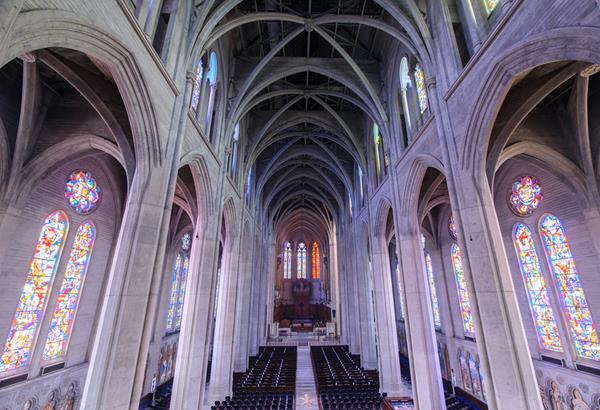
Allegations of sexual abuse committed by Roman Catholic Church clergy have led to a painful reckoning for Catholics around the world, including those in California. Many of the most disturbing accounts tell of sexual misconduct committed against children by trusted priests, and of church decisions to turn a blind eye to the abuse rather than to address it. In California, survivors of clergy abuse have, among other avenues, resorted to legal action to seek accountability.
Roman Catholic diocese across California were identified on the website BishopAccountability.org as homes to parishes where clergy members accused of sexual misconduct once ministered. The diocese identified are:
- Archdiocese of Los Angeles
- Archdiocese of San Francisco
- Diocese of Fresno
- Diocese of Monterey
- Diocese of Oakland
- Diocese of Orange
- Diocese of Sacramento
- Diocese of San Bernardino
- Diocese of San Diego
- Diocese of San Jose
- Diocese of Santa Rosa
- Diocese of Stockton
The empathetic, knowledgeable clergy abuse injury lawyers at Winer, Burritt, Scott & Jacobs, LLP, urge California survivors of clergy abuse to contact us with any questions you may have about seeking accountability from the church through the courts. We want to help, and we offer a free, confidential, no-obligation consultation.
Clergy Abuse Accountability in California Courts
Taking legal action in a California court is just one of the many ways survivors of clergy abuse can, and do, seek accountability. Ever since widespread allegations of the Catholic Church clergy abuse began to emerge at the beginning of the 2000s, brave survivors have stepped forward to advocate for change and justice within the church and outside of it.
Civil legal action is a powerful tool for achieving those ends. In lawsuit after lawsuit across the country, including in California, evidence has come to light demonstrating not only that individual clergy members engaged in repeated acts of sexual abuse, but that the church’s response was to protect itself rather than to protect the vulnerable victims. In many cases, it appears that rather than removing clergy members credibly accused of abuse from contact with parishioners (especially children) and turning them over for prosecution, the church merely reassigned them to other parishes where they victimized others.
California law permits survivors of sexual to sue their abusers and others who enabled abuse for damages and other relief. The law sets fixed time limits on when survivors must file those claims, but the limits vary depending on whether the survivor was a child or an adult when the abuse happened. If a bill recently proposed in the California Assembly becomes law, those time limits may expand for childhood abuse claims.
California Legal Remedies for Clergy Abuse
Survivors of clergy abuse have many reasons for coming forward. One of those is their desire to heal the physical, emotional, spiritual, and even financial wounds inflicted by clergy abuse. To that end, a lawsuit enables survivors to see monetary damages not just from individual clergy members, but also from church institutions that created conditions that made abuse possible.
Another powerful reason survivors take action is to help prevent future clergy abuse. In California, the remedies for clergy abuse can help further that end, also. A litigant may seek punitive damages for intentional misconduct, aimed at punishing and deterring that misconduct in the future. Plaintiffs can also ask California courts to award injunctive relief, which essentially amounts to a court order directing specific actions to prevent future clergy sexual misconduct.
Of course, there are no guarantees in civil litigation. Not all lawsuits succeed. That said, during the past decade-plus, survivors nationwide have obtained a degree of justice and accountability through these actions in the form of substantial monetary damages and proactive relief that will protect the public from clerical abusers.
New Clergy Abuse Statute of Limitations For Adult Abuse in California (new law effective January 1, 2020)
In October of 2019, California Governor Gavin Newsom signed AB 218 into law which gives survivors of clergy abuse greater opportunities to seek justice and hold predator clergy members accountable for their actions. The law, which goes into effect January 1, 2020, extends the age limit from 26 to 40 for a survivor of sexual abuse in their childhood to bring an action against those responsible. So now, if someone was sexually molested or assaulted by a clergy member, he or she has until their 40th birthday to make a claim or within five years of the time it is discovered they suffered damages as a result of the assault (whichever comes later).
AB 218 also allows a three-year window in which claims that may have expired due to the old statute of limitations can be revived. In a case where childhood sex abuse by clergy was covered up, the new law allows a court to award recovery of up to treble damages from the defendant who engaged in the cover-up.
California Clergy Abuse Attorneys
Winer, Burritt, Scott & Jacobs, LLP, is a California-based law firm that has made a commitment to helping survivors of clergy sexual abuse. We invite any survivor who believes he or she may be ready to seek accountability through the California legal process to call us at (800) 652-6137 or visit us online to schedule a free, confidential, no-obligation consultation with a member of our team.
AB 218 is a new law that gives victims of childhood sexual abuse more time to seek justice through the courts. The new law also extends the statute of limitations. This is important for victims because many times, they will not disclose any details of the abuse they endured, and now have the option to speak out. WBS’s John Winer wrote an article for SNAP, the Survivors Network of those Abused by Priests. “While some survivors may stay silent for years, that doesn’t mean the sexual abuse was okay or didn’t matter. It takes an unspeakable amount of courage to speak out and expose wrongdoing.”
